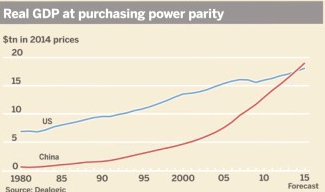A trio of surprising news stories about China came to light this week.
- In less than a generation, China is expected to have more Christians than any country in the world.
- In less than a year, China is predicted to beat out the US as the world’s #1 economic power.
- Some Chinese scholars are suggesting a direct link between Christianity and what is often called the “Chinese economic miracle.”
Eric Metaxas reports at BreakPoint on a book by Purdue sociologist Fenggang Yang, Religion in China: Survival and Revival under Communist Rule. The premise of Yang’s book is that “by some estimates there’ll be more Christians in China come the year 2030 than in any other country in the world.” The growth of the church in China has national leaders torn between two uncomfortable positions. On the one hand, Christianity brings freedoms, and no communist can accept that. But at the same time, they don’t want to lose the influence of Christianity on their society’s economic success.
 Which brings us to the second story. Here’s one way to tell it.
Which brings us to the second story. Here’s one way to tell it.
In 1872 Ulysses S. Grant was re-elected US President, Jesse James robbed a bank in Kentucky, and the United States beat out the UK to become the world’s #1 economic power. But that 142-year supremacy is about to end. The forecasters now believe China will move into the top spot later this year, four years ahead of the earlier prediction of 2019. That’s the story reported in yesterday’s Financial Times, “on the basis of new figures published today by the world’s leading statistical agencies.”
Rest assured you’ll be hearing more about that story. Here’s what may not get as much press.
Peter Cai, writing in China Spectator, recently reported that three Chinese professors—Yuyu Chen, Se Yan and Hui Wang—make the case that that there’s a connection between Christian missionary work and Chinese economic growth. Here are some excerpts from his article, “Jesus and the Chinese economic miracle.”
- “In a nutshell, Protestant missionaries helped to build China’s human and social capital before Mao took over in 1949. These cultivated values and capital endured even through Mao’s mad reign and have been put to good use again after China opened itself to the world again.”
- “The Peking university scholars’ argument does not deny the importance of the historic change unleashed by Deng and his followers but they point to another element of the story — the crucial role played by the protestant missionaries in spreading Western science, technology and social values in China.”
- “A lot of China’s best education institutions including Peking University can trace their origins to missionary schools in the 19th and 20th centuries. … graduates from missionary schools went on to become much-needed professionals in China such as engineers, doctors, teachers and other professionals.
- “China’s best medical school — the Peking Union Medical College — was founded by Christian missionaries.”
Cai points to Max Weber’s book, The Protestant Ethic and the Spirit of Capitalism, published in 1905, in which the author observed that “Protestant countries usually have more developed capitalist economies.” Weber said that, as did the “father of modern economics,” Adam Smith.
Protestant theology lies at the root of capitalism. As we have quoted elsewhere, David Aikman, in Jesus in Beijing, wrote a decade ago about Chinese scientists who visited the US who recognized that “in the past twenty years, we have realized that the heart of your culture is your religion: Christianity. That is why the West is so powerful. The Christian moral foundation of social and cultural life was what made possible the emergence of capitalism and then the successful transition to democratic politics.”
The Bible affirms God as Creator and man as steward. The Cultural Mandate which spurred the blessing of Western nations where Judeo-Christian virtues have been honored does not belong to the West! The gospel is supposed to change nations. China is the unlikely evidence that it does!
– Gary Brumbelow






1 Comment
Jon
May 1, 2014 - 10:53 pmThumbs Up! 🙂